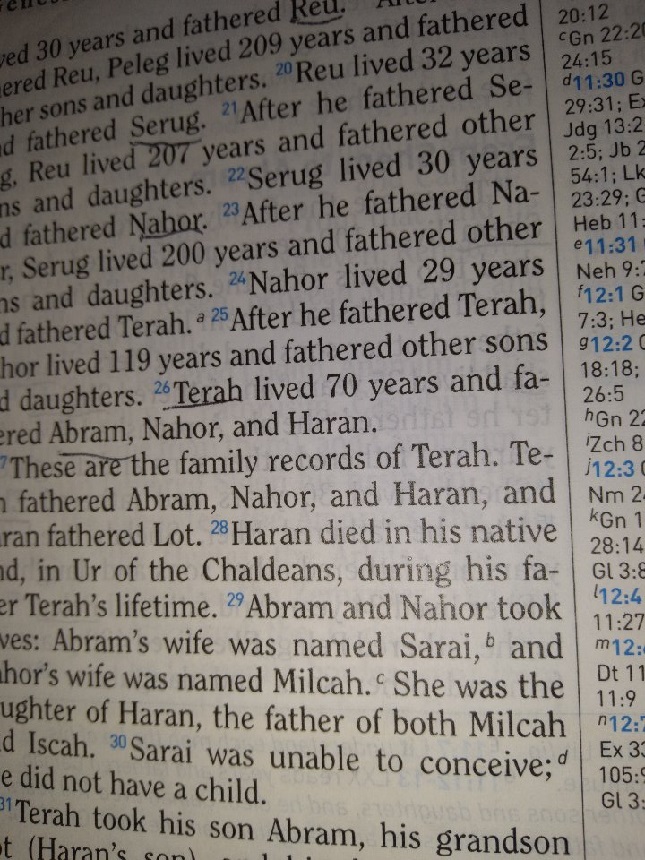Genealogies of the bible
Ever wonder why God would include lists and lists of names of who begat who? It may be hard for some to read and give attention to such lists, but one of the questions people had was, "Is God still interested in us? The answer to that for them was yes, and for us is the same.
One of the messages in the genealogies of the Bible (lists of ancestors or descendants) is that God's ultimate plan remains in place for His people to be in a covenant relationship with Him, even though there may be diversions from the track.
Secondly, a major part of God’s revelation included genealogies-- from the start of the human race to God’s choosing of the nation of Israel as His people to the Gospels that reveal the line of the Messiah—Jesus Christ.
A list of passages containing genealogies are as follows:
• Genesis 4
• Genesis 5:1-32
• Genesis 10
• Genesis 11: 10-32
• Numbers 1:2-4
• Numbers 7:11-82
• Ruth 4:18-22
• I Chronicles 1-10
• Gospel of Matthew 1:1-17
• Gospel of Luke 3:23-28
Genealogies of the Bible show how God fulfilled the prophecies surrounding the Messiah—Jesus Christ, and that Christ work of redemption at Calvary’s cross extended to all mankind.

What is the encouragement for today from the Genealogies of the Bible?
I get it. It’s hard to read through a long list of names that are hard to pronounce and that sound very odd, as practically none of the names are used today. We can glance over these passages though with the following reflections on how God uses these passages to encourage us in our walk with Him.
1. God includes and uses imperfections to carry out His plans-- reflecting His grace and love.
How specifically do genealogies encourage us about God’s grace?
In the patriarchal culture that characterized the world of the New Testament, the line of Jesus included women.
The four women included...
• one who was in an incestual relationship,
• another who was a prostitute,
• as well as one who was a foreigner—from a nation which was Israel’s enemy.
• The fourth one was Bathsheba, who was the adulterous wife of Uriah.
From a purity standpoint, authors from the patriarchal culture of that time would not have made up such a list. Jesus was in a geneaological record that included sinful imperfections, though He Himself was without sin. what a demonstration of God's grace!
I do want to point out an application from the sinners included in that line of the Messiah. One can see the women as representing the fallen human race in general, which includes the men too. God rebuked Adam as well as Eve.
The impurities extend through the whole of mankind, because apart from Christ no one is righteous. All have fallen short of God's glory.
2. God went to great lengths to redeem you and bring you into a relationship with Him.
Genealogies present God as a personal being who thinks about us and longs to bring us into a relationship with Him. The lists of names show His sovereignty and faithfulness to His promises.
For example, you find prophecies about a redeemer and the birth of Christ in the Old Testament. In the New Testament genealogies, we see the fulfillment of that prophecy, showing how the birth of Christ came about according to God’s perfect plan.
The encouragement to our faith is that God cares about the details and the big picture of our lives. He went to great lengths to redeem us through His Son, and so, we can trust that He has a plan and will accomplish His purposes as we continue on life’s journey.
3. Genealogies show how God works faithfully over time to accomplish His purposes.
God knows the end from the beginning and has a plan for our lives. Even before Jesus came to earth, the plan for redemption was set in motion through genealogical lines. We're talking Millenia before God's ultimate provision for us.
In our own lives, God's plan is unfolding, even though we may not immediately realize it.
He works in our life situations and through the people in our lives to fulfill His plan for each of us as well as His overall purpose in creation. In the times we’re living in now, that purpose is related to Christ’s return.
If you'd like to explore the genealogy structure and segment in the Book of Matthew and the Gospel as a whole for that matter, check out The Gospel of the Son of God: An Introduction to Matthew by David R. Bauer:
Jeffrey Kranz has some good stuff on the genealogy as presented in the Gospel of Matthew:
Matthew's Genealogy: 5 Subtle Clues Modern Readers Might Miss (overviewbible.com)
Free download: infographic on Jesus' genealogy - OverviewBible
---------------------------------------------------------------------------------------------------------
For more on the Bible's message as a whole, check out this page:
What is the Bible? (encouragementscriptures.com)
Also, the Bible is made up of a number of different genres. Learn more about what they are in my page (and how a genre like ancient biography affirms the Christian faith).
Genres of the Bible (encouragementscriptures.com)